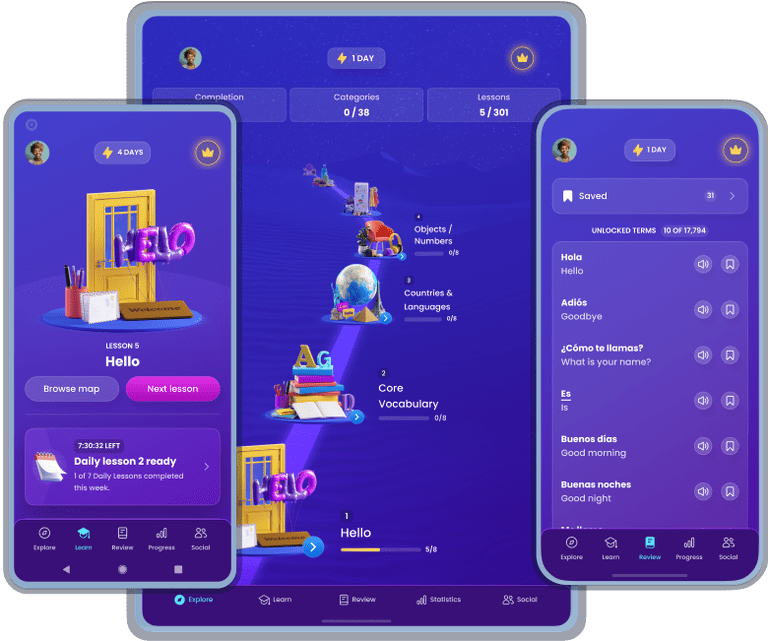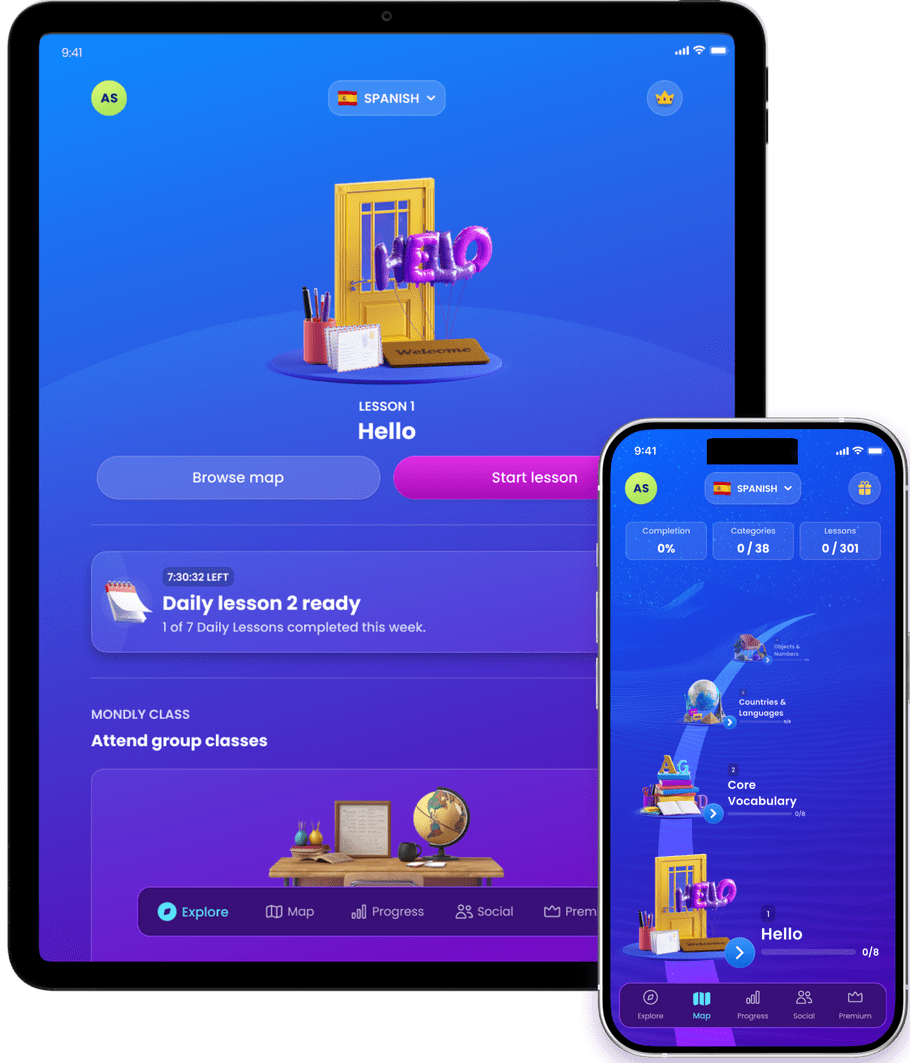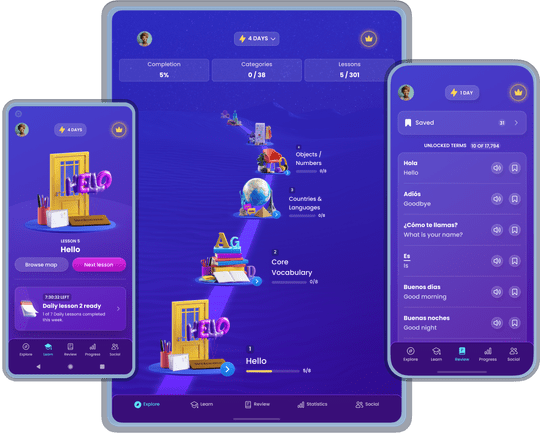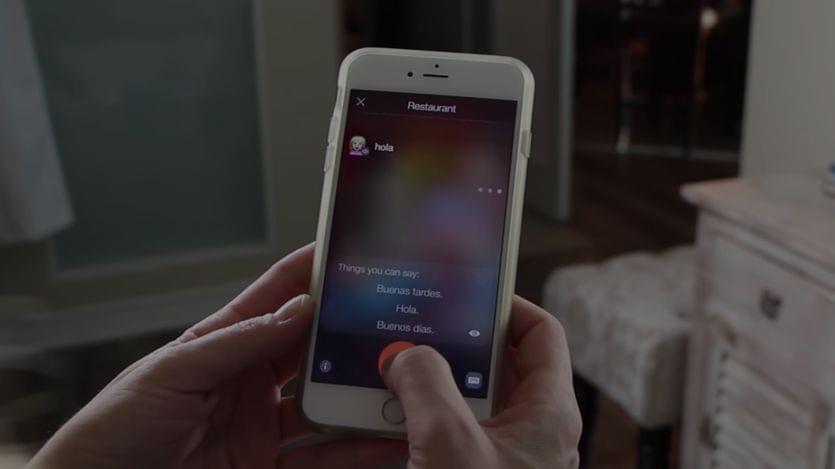How to speak English fluently in no time
How to speak English fluently
Here are some more tips on how to improve your spoken English.

Speak English fluently from day 1
Did you know that learning by doing is the most effective learning method? Practice English a little bit every day and you’ll speak like a native forever! Start right now with these top 10 most common English words and phrases pronounced by fluent English speakers.
1. Hello.
First impressions matter. Don’t let anyone tell you otherwise. Learning as much as a simple “hello” in English can work wonders in your interactions with the natives. So here’s exactly how to pronounce it:
Hello.
2. How are you?
The next polite thing to do is ask “how are you?”. Sometimes, you can even skip the hello and directly ask how are things. Here’s how to pronounce it in English:
How are you?
3. What is your name?
When you travel abroad, you usually make a lot of new friends. Whether we are talking about the nice stranger on the plane, your host or the driver, here’s how to ask them what’s their name:
What is your name?
4. Nice to meet you.
The natives will always regard your attempt to speak their language as a sign of respect towards their culture. Another basic phrase you can use when making new friends is “nice to meet you”. Click and listen to how is it pronounced:
Nice to meet you.
5. Please.
Manners are a must everywhere you go. And England makes no exception. Saying “please” the right way and at the right time will open many doors in your path. To pronounce it in English, you simply say:
Please.
6. Thank you.
Mothers are the best thing that ever happened to us. Not only did they raise us, but they also taught us basic manners like saying “thank you” in the proper contexts. Following their example, here’s how to say “thank you” in English:
Thank you.
7. You're welcome.
It doesn't matter where you are in the world. Common sense translates the same in all languages. Here's how a person from London would say “you’re welcome”:
You're welcome.
8. Excuse me!
We only need 7 seconds to make an impression that may last a lifetime. And sometimes, the only difference between a good impression and a bad one is just a simple “excuse me”. Listen to how it's pronounced in English:
Excuse me!
9. How much does it cost?
Shopping sprees are an essential part of every city break. The vacation isn’t over until you buy souvenirs for each member of your family. So here’s how to ask “how much does it cost?” in English:
How much does it cost?
10. Goodbye.
If you want to maintain the good first impression you managed to make with your flawless English greetings and introductions, end the conversation by saying “goodbye” exactly like a native:
Goodbye.




1 000 000+ + Ratings
Mondly was named "Editors' Choice" in Google Play and "Best New App" by Apple.
Basic English pronunciation rules
-
Vowels: Long vowel or short vowel?
1. If you have one vowel next to a consonant, it’s usually a "short vowel" as in red, bed, cut, etc.
2. If you have one consonant between two vowels, you usually pronounce the first vowel as a "long vowel" as in shape, grape, table, etc.
3. If you put a vowel before a double consonant, two hard consonant sounds, or a consonant that sounds like two consonants (such as x), you’ll pronounce it as a "short vowel" as in sand, hand, bond, etc.
ee: Almost always sounds like a "long e" as in queen, deep, etc.
oi: Almost always sounds like "oi" as in noise, boil, coin, etc.
ei: Sounds like a "long a" such as neighbor, foreign, leisure, etc. If it comes after a "c", it will have a long e sound as in perceive, receive, etc.
ou: Sounds like "au" as in about and round. There are several word combinations like oup, ought, and ould that break the rule.
oo: Sounds like a "long u" as in cook, pool, soon, etc but k comes after oo, it sounds like a short u as in look, book, etc.
c: Sounds like "c" before the vowels a, o, or u as in cut, cat, coin. Sounds like an s before an i, e, or a y as in civil, cycle, etc.
g: Sounds like a "soft g" before an i, e, or y as in energy, magic, logic, etc. If it is at the end of the word, before a, o, or u, and other consonants like l or r come after g, it sounds like a "hard g" as in bag, flag, garbage, etc.
th: There are two kinds of th voices: unvoiced and voiced. The examples of unvoiced th are thick, math, thanks while voiced words are this, mother, together etc.
h: We mostly pronounce "h" at the beginning of the words as in him/her, hurt, hush but we don't pronounce it if the word has a Latin or Romance origin like honest, hour, honor etc.
ed: Sounds like "id" or "ed" after a t or d as in planted, stranded. Sounds like t after p, k, f, gh, sh, ch, ss, c, and x as in hoped, washed, danced, etc.
However, most of the time, "i" breaks that rule as in kind, wind, find, etc.
Diphthongs: the combinations of two vowels
Consonants


Speak English in Virtual Reality
Meet Mondly VR, the first virtual reality application that helps you learn to speak English. Put your VR headset on and feel immersed in a world of languages. Order some fish and chips in a restaurant in London, have an exciting English conversation in a train going to New York or check into a hotel in Sydney. It’s the closest thing to being there and that’s exactly what makes it so effective in learning English.
In VR, you learn how to speak English by practicing the same situations in the comfort of your own home. Practice as many times as you like in a safe environment and get instant feedback until you get it right. As a result, you’ll gain the confidence to apply what you have learned in the real world. Ultimately, Mondly is all about teaching you how to speak English so you can have real life conversations with natives. No doubt about it, Mondly VR supercharges your learning and makes learning to speak English efortless.


English accents around the world

It’s next to impossible to guess the exact number of English accents in the world. However, it is estimated that there are over 160 different English dialects spread across the globe. In the UK alone, there are over 40 different English accents and dialects.
British English Accents – The main regional English accents are the Queen’s English (also known as the Received Pronunciation), and the Yorkshire, Cockney, Birmingham, Georgie, Welsh, Northern Irish, Scottish, and Glasgow accents.
North American English Accents – The main Northern American accents are the New York City accent, and the Southern, the Canadian English, and the standard American English accents.
Australian English Accent – The Australian accent is famous for using an inflection at the end of sentences, which can make statements sound like questions.

Speaking English has major benefits

Being able to speak with almost 1 billion English speakers
English is the 2nd most spoken language worldwide, so you'll definitely have a lot to gain by learning conversational English. For example, you'll be able to interact with people anytime you visit England, the United States or Australia.

Traveling to English speaking countries gets way better
Wherever you plan to travel to the United Kingdom or the United States, speaking English will enhance your experience significantly. You will be able to experience English speaking countries like a native and have an authentic experience in the process.

Speaking English can save your career
Being able to speak English increases your employability significantly and makes you stand out from the crowd. This means that you will have better chances of getting a well paid job in the first place, better chances of getting promoted or getting a better job in an English speaking country.

Speaking English makes you smarter
Studies indicate that being bilingual or a polyglot increases the grey matter in your brain. This means that speaking English makes you smarter than you currently are. So, what are you waiting for?














